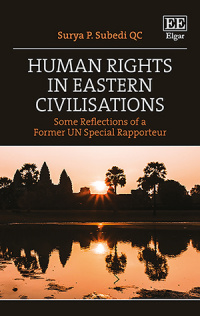精装
东方文明中的人权
一个前联合国特别报告员的一些思考
9781800883611 爱德华埃尔加出版
根据提交人作为联合国特别报告员的第一手经验,这本探望和原始书籍审查了东方文明的价值观及其对联合国人权议程发展的贡献。本书驳回了往往用于破坏人权普遍性的“亚洲价值观”的论点,认为世俗主义,个人自由和普遍主义是印度教和佛教传统的核心。
更多信息
的一致好评
内容
更多信息
根据提交人作为联合国特别报告员的第一手经验,这本探望和原始书籍审查了东方文明的价值观及其对联合国人权议程发展的贡献。
QC Surya P. Subedi对印度教和佛教传统进行了权威分析,着重于支撑这两种开创性东方哲学的规范,以评估古代文明已经在何种程度上嵌入了人权价值观。各章节探讨了这些哲学在经文和实践中的价值表达,评估了它们对当代对人权的理解的影响。本书驳回了往往用于破坏人权普遍性的“亚洲价值观”的论点,认为世俗主义,个人自由和普遍主义是印度教和佛教传统的核心。
《东方文明中的人权》提供的独特视角将吸引广泛学科的学生、学者和研究人员,包括人权、国际法和关系,以及宗教研究。
QC Surya P. Subedi对印度教和佛教传统进行了权威分析,着重于支撑这两种开创性东方哲学的规范,以评估古代文明已经在何种程度上嵌入了人权价值观。各章节探讨了这些哲学在经文和实践中的价值表达,评估了它们对当代对人权的理解的影响。本书驳回了往往用于破坏人权普遍性的“亚洲价值观”的论点,认为世俗主义,个人自由和普遍主义是印度教和佛教传统的核心。
《东方文明中的人权》提供的独特视角将吸引广泛学科的学生、学者和研究人员,包括人权、国际法和关系,以及宗教研究。
的一致好评
这本书及时而重要地探讨了自1948年以来经济和政治力量向亚洲转移对全球人权议程的影响。前联合国柬埔寨人权特别报告员苏利亚·苏贝迪以他独特的视角,包括他对印度教和佛教教义的了解,认为这些重要宗教与《世界人权宣言》中表达的价值观有着根深蒂固的共同价值观,全球力量的转移不会导致对人权议程的偏离。”
- 夏洛特·卢,德克萨斯州A&M大学法学院
‘Surya P. Subedi, now Professor of International Law at the University of Leeds, was born in a simple Nepali village and received a Sanskrit education until the age of 13. This book records his passionate and very personal attempt to bridge two worlds, to bring the world of his Brahmin ancestors, the Hindu civilization that they embodied, into harmony with the modern world of human rights and to show that there need be no contradiction, and indeed that human rights can receive succour from the well-springs of Hinduism and Buddhism.’
- 英国牛津大学David N. Gellner
- 夏洛特·卢,德克萨斯州A&M大学法学院
‘Surya P. Subedi, now Professor of International Law at the University of Leeds, was born in a simple Nepali village and received a Sanskrit education until the age of 13. This book records his passionate and very personal attempt to bridge two worlds, to bring the world of his Brahmin ancestors, the Hindu civilization that they embodied, into harmony with the modern world of human rights and to show that there need be no contradiction, and indeed that human rights can receive succour from the well-springs of Hinduism and Buddhism.’
- 英国牛津大学David N. Gellner
内容
内容: Introduction 1. Evolution of Eastern belief systems 2. Human rights values in Eastern civilisations 3. The principles of humanitarian law in Hinduism 4. China’s approach to human rights and the UN human rights agenda 5. The impact on the universality of human rights of the shift of power to the East 6. Human rights challenges in a country with a Hindu-Buddhist heritage: A case study of Cambodia Conclusions Index





